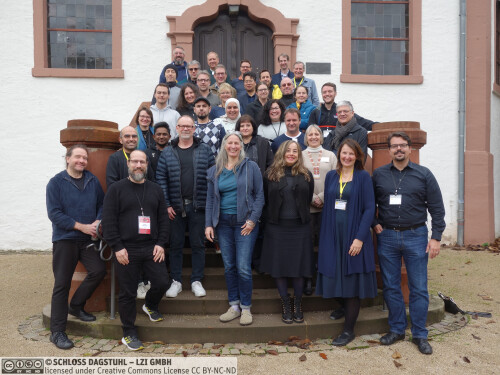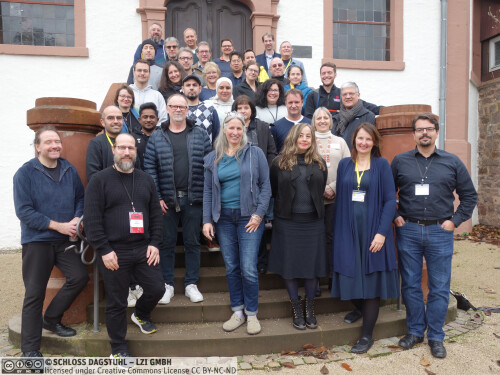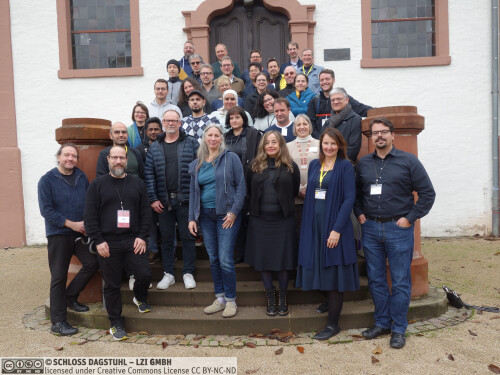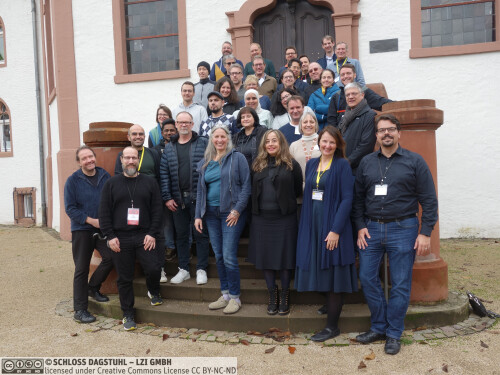Dagstuhl Seminar 23451
Visualization of Biomedical Data – Shaping the Future and Building Bridges
( Nov 05 – Nov 10, 2023 )
Permalink
Organizers
- Katja Bühler (VRVis - Wien, AT)
- Barbora Kozlíková (Masaryk University - Brno, CZ)
- Michael Krone (Universität Tübingen, DE)
- Cagatay Turkay (University of Warwick - Coventry, GB)
Contact
- Marsha Kleinbauer (for scientific matters)
- Simone Schilke (for administrative matters)
Schedule
The goal of this seminar was to tackle pivotal challenges concerning the future of visualization for biology and medicine. Emphasizing a collaborative and interdisciplinary approach, the seminar brought together 36 leading experts and emerging researchers from academia, media, and industry covering the fields of bioinformatics, biological, and medical visualization. The seminar endeavored to delve into the multifaceted role of biomedical visualization in science communication and interactive exploratory analysis. This involves navigating the increasing complexity of biomedical data that can be acquired today, with a spotlight on integrating information from diverse sources and modalities. Examples are visualizing multi-omics data, facilitating within- and across-cohort analysis, and illustrating dynamic cellular processes. Additionally, there is an intersection of visualization with artificial intelligence in biomedical visual analytics applications, exploring how to make Artificial Intelligence (AI) outcomes comprehensible and actionable in critical decision-making processes. The seminar focused on four key topics vital to the intersection of visualization, biology, and medicine:
- the role of biomedical visualization in communicating complex processes to both expert and broad audiences,
- the challenge of mastering the complexity and multi-modality of biomedical data, emphasizing integrative approaches that can help bridge various scales and data modalities from diverse sources,
- the synergy between visualization and AI in biomedical applications, and
- shaping curricula for biological and medical visualization and the definition of content, structure, and goals for a future educational platform.
During the first day of the seminar, these topics were further developed through joint brainstorming, taking into account the interests of the participants and the need to keep up with the fast-paced developments in the field of AI and its increasing influence on biomedical visualization and related research fields.

Six working groups emerged from this process, working over the next four days of the seminar accompanied by daily summary sessions in the plenum:
- Bridging Scales, Data, and Modalities to discuss the changing nature of biological visualization adapting to the needs of biologists as a result of the massive increase in the scale of the data and the increasing need to cross traditional domain boundaries.
- The Role of Data Visualization in Instigating Behavior Change (to Promote Healthy Lifestyles) to discuss how data visualizations can be used in a dialogue between medical practitioners, researchers, and the public as a fundamental component in preventive healthcare.
- A Rollercoaster Ride into the Future: AI-in-the-loop for Visual Workflows in Biomedical Data Analytics to discuss opportunities and challenges that recent developments in AI present for the visual analysis of biomedical data.
- Components of a Syllabus for Life Science Data Visualization to discuss topics related to education and educational platforms.
- Beyond the Desktop: Leveraging Immersive Environments for Biomedical Data Analysis -- Challenges, Vision, and Guidelines to discuss challenges in immersive analytics in biomedical analysis scenarios.
- Spatio-Textual Interaction in Visualization to experimentally explore the capabilities of current large language models for spatial interaction with data.
Five lightning talks complemented the group work and acted as inspirational prompts to spark discussions:
- Exploring Relations among Topics in Neuroscience Literature using Augmented Reality, by Lynda Hardman, CWI - Amsterdam, NL & Utrecht University, NL
- Is that right? Visualizations for scientific data quality control, by Devin Lange, University of Utah
- Can ML/AI be Taught in Schools? by Blaz Zupan, University of Ljubljana
- Visualization building blocks for analysis, not the end of pipelines, by Trevor Manz, Harvard Medical School
- How to design data visualizations for a (very) broad audience, by Matthias Stahl, Der Spiegel
The seminar stimulated lively discussions on the future of biomedical visualization research and education in response to the increasing data complexity and related demands on interactive data analytics systems and the impact of AI on our field. All working groups are planning follow-up activities, including meetings and joint publications based on the insights gained.
Overall the seminar was a great experience bringing together researchers from different academic and non-academic backgrounds, experience and interests bridging from life science to medical applications to communication and media and from visualization technology to display technology and recent development in AI. We envision that the outcomes from the working groups will foster the links between these areas and help establish a consolidated research agenda to approach the challenges that lie ahead.
 Barbora Kozlíková, Katja Bühler, Michael Krone, and Cagatay Turkay
Barbora Kozlíková, Katja Bühler, Michael Krone, and Cagatay Turkay
The last decades of advancements in biology and medicine and their interplay with the visualization domain proved that these fields are naturally tightly connected. Visualization plays an irreplaceable role in making, understanding, and communicating biological and medical discoveries.
This Dagstuhl Seminar will serve as an interdisciplinary platform for a collective approach to the contemporary and emerging future scientific and societal challenges at the intersection of visualization, biology, and medicine in the context of increasing complexity in data, data analytics and data-intensive science communication. Building on the success of the previous seminars and our ongoing community efforts, participants of this seminar will critically tackle three pressing, highly relevant scientific questions of interest to the bioinformatics, medical informatics, and visualization communities:
- Mastering the increasing complexity and amount of data that are produced in biomedical research. The situation urgently needs a systematic approach to bridge scales in data, data modalities, and domains. We will address open questions related to the integration of data from different sources and modalities (e.g., imaging, omics, or molecular structures) in holistic visual analytics systems, but also discuss strategies to support the development towards personalized and precision medicine requiring an interdisciplinary approach to fusing data and methods across domains.
- The role of visualization in supporting interdisciplinary research and in communicating biological and medical discoveries to experts and broader audiences. Here we want to reflect on and critically evaluate the key role that data visualizations increasingly play in policy-making and shaping public debate, as seen, for instance, during the COVID-19 pandemic. This will be followed by a discussion on establishing visualization as a fundamental bridge between biomedical research and the general public, and the development of a pathway to achieve this vision.
- Visualization for a user-centric and trustworthy AI in biomedical applications. Trustworthiness of AI-driven data analytics is one of the core topics of ongoing AI research and part of upcoming legal frameworks in the EU and other countries. Explainability and transparency of machine-made decisions are particularly critical and play a vital role in the biomedical domain due to the prominence of high-risk applications. Central to our discussion within this seminar will be the current use and future potential of visualization in realizing a human-centered and trustworthy AI in the context of biomedical applications catering to a wide diversity of stakeholders.
The primary goal of this Dagstuhl Seminar is to strengthen and widen a sustainable and vibrant interdisciplinary community of biological, medical, and visualization researchers from both academia and visualization through an in-depth, comprehensive, and inclusive exchange of ideas, experiences, and perspectives. Through the identified key topics, spanning methodological, technical, infrastructural, and societal challenges, we plan to seed several discussions and exchange of ideas on the most pressing problems among the biological and biomedical domains and how these problems could be approached through data visualization and open up room for innovation in designs and methodologies. We anticipate that these interactions will result in joint publications, research proposals, and further collaborations among the participants.
 Katja Bühler, Barbora Kozlíková, Michael Krone, and Cagatay Turkay
Katja Bühler, Barbora Kozlíková, Michael Krone, and Cagatay Turkay
- Jan Aerts (Amador Bioscience - Hasselt, BE) [dblp]
- Jillian Aurisano (University of Cincinnati, US) [dblp]
- Marc Baaden (Laboratoire de Biochimie Théorique - Paris, FR) [dblp]
- Stefan Bruckner (Universität Rostock, DE) [dblp]
- Katja Bühler (VRVis - Wien, AT) [dblp]
- Nadezhda T. Doncheva (University of Copenhagen, DK) [dblp]
- Mennatallah El-Assady (ETH Zürich, CH) [dblp]
- Carsten Görg (University of Colorado - Aurora, US) [dblp]
- Zeynep Gümüs (Icahn School of Medicine at Mount Sinai - New York, US) [dblp]
- Lynda Hardman (CWI - Amsterdam, NL & Utrecht University, NL) [dblp]
- Thomas Höllt (TU Delft, NL) [dblp]
- Ingrid Hotz (Linköping University, SE) [dblp]
- Tobias Isenberg (INRIA Saclay - Orsay, FR) [dblp]
- Helena Jambor (Universitätsklinikum TU Dresden, DE) [dblp]
- Karsten Klein (Universität Konstanz, DE) [dblp]
- Barbora Kozlíková (Masaryk University - Brno, CZ) [dblp]
- Michael Krone (Universität Tübingen, DE) [dblp]
- Torsten Kuhlen (RWTH Aachen, DE) [dblp]
- Devin Lange (University of Utah - Salt Lake City, US) [dblp]
- Trevor Manz (Harvard University - Boston, US) [dblp]
- Georgeta Elisabeta Marai (University of Illinois - Chicago, US) [dblp]
- Scooter Morris (University of California - San Francisco, US) [dblp]
- Kay Katja Nieselt (Universität Tübingen, DE) [dblp]
- Ramasamy Pathmanaban (Ghent University, BE) [dblp]
- Bruno Pinaud (University of Bordeaux, FR) [dblp]
- James Procter (University of Dundee, GB) [dblp]
- Renata Georgia Raidou (TU Wien, AT) [dblp]
- Timo Ropinski (Universität Ulm, DE) [dblp]
- Falk Schreiber (Universität Konstanz, DE) [dblp]
- Thomas Schultz (Universität Bonn, DE) [dblp]
- Matthias Stahl (DER SPIEGEL - Hamburg, DE)
- Cagatay Turkay (University of Warwick - Coventry, GB) [dblp]
- Pere-Pau Vazquez (UPC Barcelona Tech, ES) [dblp]
- Anders Ynnerman (Linköping University, SE) [dblp]
- Xiaoru Yuan (Peking University, CN) [dblp]
- Blaz Zupan (University of Ljubljana, SI) [dblp]
Related Seminars
- Dagstuhl Seminar 12372: Biological Data Visualization (2012-09-09 - 2012-09-14) (Details)
- Dagstuhl Seminar 18161: Visualization of Biological Data - Crossroads (2018-04-15 - 2018-04-20) (Details)
- Dagstuhl Seminar 21401: Visualization of Biological Data - From Analysis to Communication (2021-10-03 - 2021-10-08) (Details)
- Dagstuhl Seminar 26101: Contextualising Complexity - Faithful Visualisations for Biology (2026-03-01 - 2026-03-06) (Details)
Classification
- Graphics
- Machine Learning
- Other Computer Science
Keywords
- Visualization
- Interdisciplinary
- Biology
- Computational biology
- Medicine





 Creative Commons BY 4.0
Creative Commons BY 4.0
